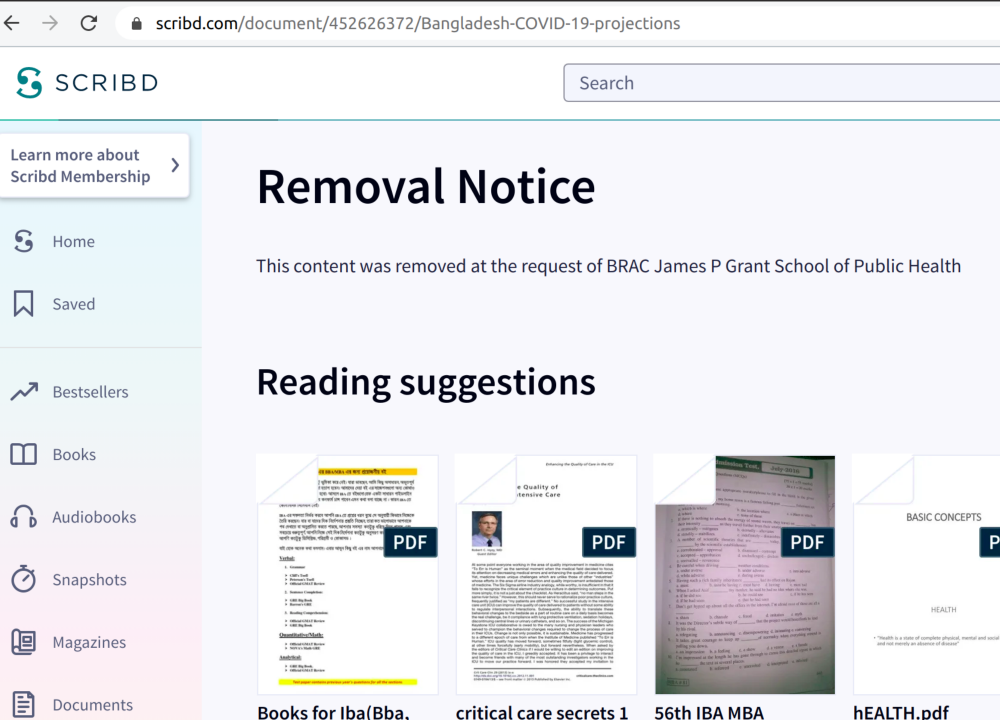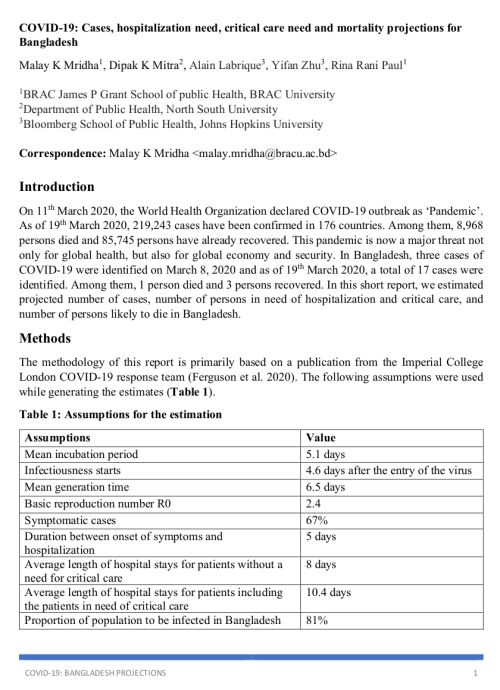Brac University attempts to restrict access to Bangladesh Covid-19 report
Bangladesh Covid-19 report removed from Scribd at the request of Brac James P Grant School of Public Health — Netra News is now making available a redacted copy of the report.

Document hosting service Scribd has removed the Bangladesh Covid-19 projections report from its website after it received a notification of copyright infringement from Brac University’s James P Grant School of Public Health. The university had earlier issued two statements saying that it “has not conducted, commissioned or published any research” about the Covid-19 situation in Bangladesh. The statements also confirmed that the university initiated an investigation against one of its researchers for his role in producing the report, which forecasted that more than 500,000 people in Bangladesh may die due to Covid-19 virus infection, unless the government takes steps to mitigate or suppress the disease.

“[The document] was removed because Scribd received a valid claim of copyright infringement pursuant to the Digital Millennium Copyright Act of 1998 (DMCA). Scribd is required to remove the content expeditiously upon receipt of a DMCA notification,” a legal operations manager of Scribd informed Netra News, which originally uploaded a pdf copy of the report and embedded it in one of its stories. The manager also shared a copy of the DMCA notification.
Before the removal on March 23rd, the report had more than 120,000 reads on Scribd.
On March 22nd, Brac James P Grant School of Public Health issued a statement signed by its dean Sabina Faiz Rashid, saying that the institution “has not conducted, commissioned or published any research regarding the Covid-19 situation in Bangladesh.” The statement also noted, “If any individual researcher publishes a paper without the knowledge and authorisation of the dean, the school’s name cannot be associated with it.”
The statement by the dean was followed by an identical statement by Vincent Chang, the vice-chancellor of Brac University. It reiterated that the university “has initiated an official investigation into the matter and appropriate disciplinary action will be taken.”
Neither statements contained any criticism of the content or accuracy of the report.
Netra News asked a Brac spokesperson to explain how Brac James P Grant School of Public Health could claim copyright of a report that it did not conduct, commission or publish. We have not received any response to our emailed query, that also included questions on Brac University’s investigation against one of its own researchers and its attempt to restrict the public’s access to the Bangladesh Covid-19 report.
Netra News is making available a pdf copy of the report, considering the immense level of public interest involved. The report was originally shared with us by government officials in Bangladesh. Based on legal advice, we have redacted a portion of the report.
Following the announcement of the investigation by Brac University, in a separate development, Dipak Kumar Mitra of North South University released a statement on his Facebook profile disassociating himself from the Covid-19 report. His name appears in the report as one of the authors.
When Netra News asked him to comment on public exchanges on Facebook between him and two other researchers — Malay Kanti Mridha (Brac University) and Alain Labrique (Johns Hopkins University) — about research collaboration on the Covid-19 report, he confirmed that he was one of the collaborators who produced it. After speaking to Netra News, Dipak Kumar Mitra removed his statement from his Facebook profile.
North South University has not issued any official statement in this regard.
Meanwhile, Johns Hopkins University’s Bloomberg School of Public Health, through an emailed comment by a spokesperson, confirmed that it had worked on the Bangladesh Covid-19 report, “Two faculty from the International Health department at the Johns Hopkins Bloomberg School of Public Health had agreed to collaborate with this research, and had prepared edits and comments on the report. Their input is not reflected in this preliminary, non-peer reviewed version of the report, so our faculty members cannot yet speak to its findings. That said, our faculty continue to collaborate with researchers and policymakers from around the world, including Bangladesh, to produce evidenced-based, data-driven studies and reports to address the urgent aspects of the Covid-19 pandemic, including infection rates, hospitalizations, mortality rates and control strategies.”
When asked by Netra News for further clarification, Johns Hopkins University said that it had “no further comment”.
In response to the Covid-19 crisis, considering an overwhelming public interest in publishing relevant research as soon as possible, most of the current clinical research and modelling on the virus are being published as preliminary reports, pending the full peer review process.
Johns Hopkins University was recently granted $500,000 from USAID “to develop and disseminate materials to raise wider awareness about Covid-19 in Bangladesh, particularly information critical for front line health care workers.” Under this grant, Johns Hopkins project staff will work under the direct management of the Institute of Epidemiology Disease Control and Research (IEDCR) in Dhaka, to give technical assistance for the Covid-19 telephone helpline. The university also works closely with the government in Bangladesh on another USAID-funded project linked to behavioural change and communication linked to public health.●
🔗 Covid-19: Without government action, over 500,000 may die in Bangladesh
🔗 Researcher in trouble for co-authoring Bangladesh Covid-19 projections